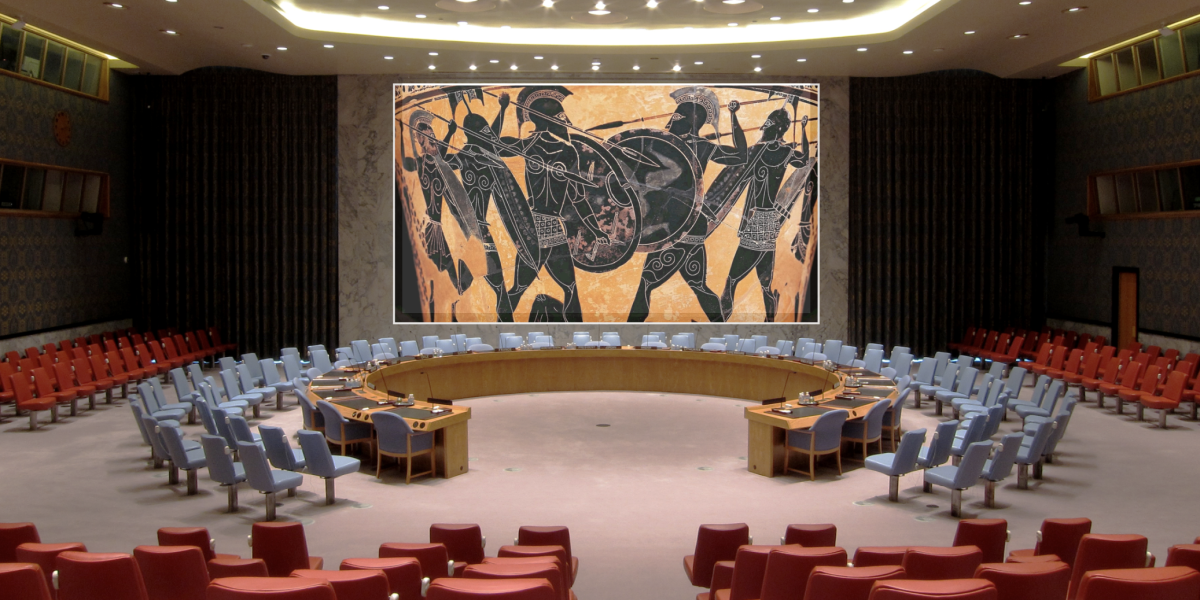Does Might Make Right? Ancient Perspectives on an Enduring Dilemma

Faculty:
Course Schedule:
Tuesdays, 9:10 - 12:30 EST (UTC -5)
Professor: Thomas Bartscherer
Semester: Spring 2024 (January 29 – May 21)
Course Level: 300
Subject: HR (Human Rights)
Number of Bard Credits: 4
Course Title: Does Might Make Right? Ancient Perspectives on an Enduring Dilemma
Max Enrollment: 16
Schedule: Tuesdays, 9:10 – 12:30 EST (UTC – 5)
Distribution Area: Historical Analysis
Cross-Listing(s): Classics, Literature
Language of Instruction: English
Speaking at the United Nations in September, 2021, U.S. Ambassador Linda Thomas-Greenfield noted that in ratifying the Charter of the UN and adopting the Universal Declaration of Human Rights, the member states were disavowing the idea, as she put it, that “might makes right,” and committing themselves instead to “a new set of self-binding principles” that aim to “prevent conflict, alleviate human suffering, defend human rights, and engage in an ongoing dialogue to improve the lives of all people.” Her remarks evoke a famous passage from an English translation of the Greek historian Thucydides, often cited as the classical statement of political realism: “The strong do what they can and the weak suffer what they must.” In this course, we will focus on the vibrant debate over the question of whether “might makes right” that occurs in the literary, historical, and philosophical writings of Athens in the fifth century BCE. Most of the texts we read will be ancient, but the questions they address are of urgent contemporary concern. We will look at the original context of that passage, wherein Thucydides conducts a subtle analysis of the claims of justice against the prerogatives of force. We will also see how this debate plays out in the philosophical writings of Plato and Aristotle and in contemporaneous literary texts, including the tragedies of Aeschylus, Sophocles, and Euripides. We will also compare material in ancient texts from other traditions, including the Buddhist Edicts of Asoka, the Hebrew Bible, and the Christian New Testament. Our aims will be: to see how these cultures, so different from the one that brought forth the UN’s Universal Declaration, grappled with this enduring dilemma; to trace the influence of the these ancient texts on modern conceptions of human rights; and to bring these diverse perspectives to bear on our own thinking about “might” and “right.” All readings will be in English.
Guidelines for the Statement of Purpose:
Craft a reflective statement of purpose explaining your interest in the Smolny Beyond Borders online course. The file should be saved with your name and course title as the filename and uploaded accordingly. Your statement’s clarity and substance will significantly influence our selection. Convey your motivations and aspirations for this course succinctly but thoroughly. Kindly write your statement in the course’s Language of Instruction.
Application Portal Instructions:
1) Use the Latin alphabet for all entries on the portal, including your name. If the Language of Instruction is Russian, you may use Cyrillic only within the Statement of Purpose file, and the title of the file should still be in English.
2) Refrain from using email addresses associated with Russian or Belarusian educational institutions.
3) While completing the “Required Information” section, ensure you fill in the “Province” field for your address.
4) Provide an address outside Russia or Belarus in both the “Required Information” and “Geographic Location Confirmation” sections of the “Online Course Application”. This ensures we can send your transcript.
5) You must press the “Sign” button twice during the application.
6) If you hold a bachelor’s degree, select “4th+” in the “Academic Year (online)” section.
7) Applicants either unaffiliated or affiliated with educational institutions in Russia and Belarus should list ‘Smolny Beyond Borders’ as their educational institution.
8) In the student ID section, enter ‘SBB’.
9) Consider drafting your motivation letter ahead of time. Save it as a separate file with this format: LastName_FirstName_CourseTitle for a smoother application process.